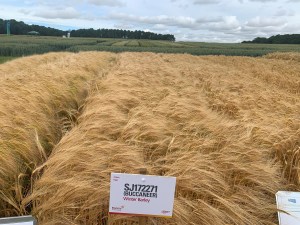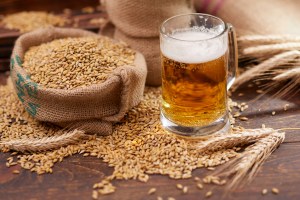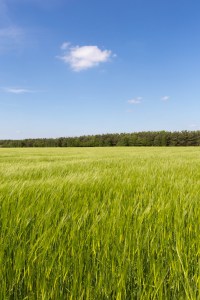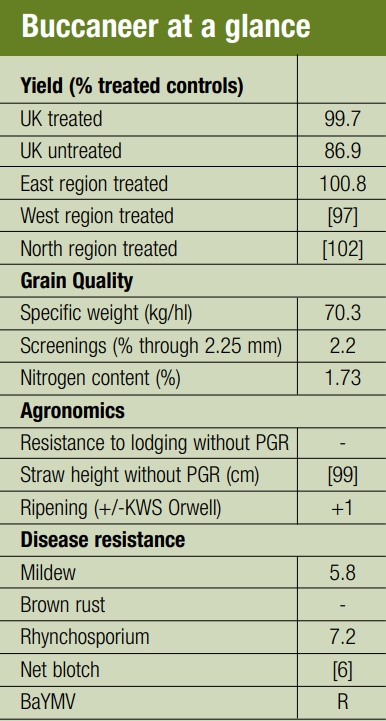Written by CPM Magazine from CPM Magazine
Download PDF
Looking to catch a favourable wind and sail the high arable seas is the new malting winter barley from Elsoms, Buccaneer. CPM hears about how this variety is setting a course to try and fly the flag for both the malting and feed markets.
By Melanie Jenkins

Andrew Creasy highlights that Buccaneer’s disease scores are as good as any winter barley on the RL.
Sailing out of a Danish breeding programme, Buccaneer first landed on UK shores from Saaten Union’s trailing station in 2018.
Every year the breeder looks at 10-12 of its varieties in UK conditions, and although Buccaneer had been flagged as a malting variety, it was the agronomics and yield which were of initial interest to Andrew Creasy of Saaten Union UK. “The variety stood out right from the beginning,” he says.
Now marketed by Elsoms, Buccaneer doesn’t just stand out in the winter malting sector, according to the firm’s George Goodwin. “It stands above the current winter malting varieties, with yields at 100% of treated control varieties on the AHDB Recommended List. The variety has a current northern yield of 102%, which is equal to market-leading two-row feed barleys, such as Bolton and KWS Tardis. It also has a strong untreated yield of 87%.”
A cross between Zophia and SJ128225, Buccaneer has taken on traits from both parents, with a lot of Zophia shining through, he says. “This is widely regarded as an uncomplicated variety to grow as it’s conventional in its habit, is clean and has good malting quality.”
Elsoms knew Buccaneer could be something special when it was screened at Saaten Union UK’s site in Suffolk, he says. “The first thing that stood out to us in the field was how clean Buccaneer was, exhibiting really strong disease resistance. The pure delight came after taking the variety to harvest. Seeing its yield, we realised we were onto something very special here as it had the benefits of being a malting type too.

George Goodwin feels the combination of yield paired with malting quality is going to be the most important characteristic going forward.
“We feel that going forward, the combination of yield paired with malting quality is going to be the most important characteristic,” states George.
Simpsons Malt had several of its growers put crops of Buccaneer in the ground last autumn, according to the firm’s Laura Beaty. “We term these as commercial trials at farm scale which will be used for our own evaluation.”
Up until this point her experience with Buccaneer had been limited, with Elsoms bringing it onto the maltster’s radar just over a year ago. “We knew they had a variety with potential and since then it’s gone on the RL in a really strong way.
“For anyone interested in malting barley, they can’t fail to take note of it because it’s a stand-out variety. There’s a very clear pull for growers as it’s almost on a level with feed barley yields but with malting quality, which I suppose is the Holy Grail. To get both characteristics in one variety is quite a rare achievement.”
In addition to yield, Buccaneer has good rhynchosporium resistance, adds Laura. “It’s rhynchosporium score is higher than a lot of the popular feed varieties.”
Andrew highlights that Buccaneer’s disease scores are as good as any winter barley on the RL. “It scores a 6 for net blotch, a 7.2 for rhynchosporium and well for brown rust.” However, AHDB is yet to publish the official brown rust score, he adds.
During trials, Buccaneer’s untreated yields were very encouraging, he says. “This is what gave us confidence to add it to National List trials and to look more into it as a malting variety.”
And as a maltster, Simpsons Malt is really interested in Buccaneer’s malting attributes. “What we’ve seen so far puts the variety in the right kind of category for malting, but this is just based on data shared by the Malting Barley Committee and Elsoms, we haven’t done our own malting analysis yet,” she admits.

A cross between Zophia and SJ128225, Buccaneer has taken on traits from both parents, with a lot of Zophia shining through.
“For us, the real test will be to see how it does this summer once our farmers’ crops are harvested. We’ll get their feedback and the initial intake analysis of grain nitrogen levels and screenings. It’ll be next winter when we start to see any malting data from it, but what we’ve seen so far is really promising.”
Buccaneer is also navigating MBC review, with full approval pending until 2024 after macro-scale trials, says George. “Going through trials, Buccaneer’s roasting feedback has been good. It’s suited to a darker roast, which can be used to enhance flavour and adjust colours – this opens up the opportunities it could be used for. The variety has shown good results for beta-glucan levels, good viscosity and hot water extract.
Laura believes that the variety will definitely gain interest from maltsters if it meets MBC’s criteria. “But at this stage it’s very hard to gauge what scale this will be on. Like anything, when there are established performers in the market like Craft, for example, it can be difficult for other varieties to come in and bypass them. Buccaneer still has work to do but everything I’ve seen so far is giving the right indications.

Buccaneer is suited to a darker roast, which can be used to enhance flavour and adjust colours.
“It’s quite a lengthy process to get malting approval but it’s important we get the best varieties because the products we’re making from malting barley in the UK are world leading.”
Buccaneer presents a good opportunity to grow a winter malting barley in the north, according to George. “Its yield is strong, and its maturity (+1 day to control) helps to spread the harvest window. The variety presents the opportunity to widen the harvest window alongside the more traditional spring barley grown in the area, offering an extended harvest movement.”
Andrew believes that Buccaneer will be best suited to growers near maltsters. “Its yields in the East are holding up better than the national average but as it’s slightly lower in the West, there may be other varieties better suited to this area.”
And Buccaneer isn’t the only contender Elsoms has introduced to the market in recent years, says Laura. “They brought Firefoxx in as a spring distilling barley and we’ve been happy to support them with that as it’s good from a maltsters point of view, plus it provides a real pull for the grower because of some of its agronomic benefits.
“It’s good to see Elsoms bringing these varieties through and we have to support breeders to do this. But if a variety doesn’t appeal to both maltsters and growers then it’s very difficult for barley to go anywhere,” she adds.

Laura Beaty believes that Buccaneer will definitely gain interest from maltsters if it meets MBC’s criteria.
But whatever happens with Buccaneer’s malting approval, there might be another challenge to overcome, according to Laura. “Being completely honest, it’s a difficult point in time for winter malting barleys because of the increasing amount of spring malting barley being grown.”
Simpsons Malt is predominantly based in the Scottish borders and covers the whole of Scotland, which has always had a strong spring growing area, she says. “The firm also has a site in Norfolk, and sources barley from there, which has historically been from winter varieties. But we’ve seen a shift in the English spring barley area with higher amounts of it being grown.

It’s a difficult point in time for winter malting barleys because of the increasing amount of spring malting barley being grown.
“There’s been a move towards dual-purpose varieties – such as Laureate and LG Diablo – and this makes it quite a crowded market for winter barley to progress in. However, from the malting analysis we’ve seen of Buccaneer, combined with the farmer benefits, it should be able to find a place.”
Andrew agrees that spring barley has been in favour over the past couple of years. “But bringing winter barley into the cropping helps growers and maltsters spread risk.”
And so far, a number of commercial companies have expressed interest in the variety, he says. “There are crops out there for producing seed and for large-scale malting evaluation, but this year I expect availability to be limited.”
George doesn’t want Buccaneer to be pigeonholed into being either malting or a feed variety. “We don’t want to just think of it as a high yielding malting, we also want it to be considered a feed as it fits the criteria for both. One thing is for sure, if Buccaneer can meet all the criteria needed for full malting approval, it won’t be a struggle to get farmers on board with its agronomics.”
Seed to malt
Having grown Buccaneer for seed, Mike Wilton was impressed with how it performed and now has a malting crop in the ground. As farm manager of the Stody Estate, near Holt in North Norfolk, Mike works predominantly light sandy land which is very reliant on extensive irrigation systems. “Although this doesn’t necessarily affect combinable crops, we do irrigate the cereals.”
The 1650ha estate has a broad cropping system, consisting of winter wheat, winter and spring barley, oilseed rape, sugar beet, maize, rye, onions, potatoes and sometimes carrots and parsnips. It also has an outdoor pig unit and large areas in stewardship agreements.
Mike first grew Buccaneer for Harvest 22. The 20ha he put in the ground really impressed him, so this year he has 10ha in the ground to go for malting. “It’s going to a specific maltster and they want to see how it performs,” he explains.
“I was very happy with Buccaneer last year as it outperformed the other seed crops – some of which were feed varieties,” says Mike. “There was one big caveat to growing it for seed, however, as it had to be grown where there’d been a two-year break from other cereals. Buccaneer followed a crop of maize which had gone in after parsnips, so it had a good break. And although it was on light land, it’s good light land that was irrigated, but so was the rest of the barley.”
The crop was planted with a Väderstad Spirit around the 15/16 October 2021, after the field had been ploughed, cultivated and levelled. “We only plough about 25% of our ground but after a crop like maize, we have to plough. Most other crops have non-inversion cultivations ahead of planting. We can’t be no-till because the soil type doesn’t lend itself to that,” explains Mike.
As weed pressures were relatively low, the crop of Buccaneer had an application of Liberator (flufenacet+ diflufenican) in mix with Hurricane (diflufenican), which was followed in the spring with Ally Max (metsulfuron-methyl+ tribenuron-methyl) to tidy up any broadleaf weeds. “We also sprayed the whole area as routine with Axial Pro (pinoxaden) for wild oats because this was a seed crop,” he adds.
The field then had a spray of Elatus Era (benzovindiflupyr+ prothioconazole) and Comet 200 (pyraclostrobin) in mid-April at T1 and then Ascra Xpro (bixafen+ fluopyram+ prothioconazole) at T2, when the awns just became visible.
“Because we didn’t want to risk it falling over, it had a small amount of Moddus (trinexapac-ethyl) PGR with the T1,” says Mike.
“Buccaneer was nice and easy to grow and didn’t cause us any grief at all. It didn’t appear to have any agronomic weaknesses in the 2022 season, but we may get a different set of weather conditions this year,” he explains.
“The crop had good uniformity, stood up nicely in the field and yielded well. Achieving just over 8t/ha, it came in above the farm’s rolling winter barley yield average. The Buccaneer performed as well as the other varieties we grew on farm, and it even had the slight edge over the six-rows.”
This season, Mike’s Buccaneer crop has gone into the ground in a second cereal situation. “This is the more traditional winter malting barley position for us. The field was ploughed to remove wheat volunteers and the crop was drilled at the end of September. It had the same herbicide programme as the previous Buccaneer crop and will get a very similar fungicide and PGR programme.”
The variety has come through the winter looking well, he says. “It shares a field with Flagon and the disease pressure in Buccaneer is visibly lower. But both look well, so I’m not concerned about either.”
Whether Mike grows Buccaneer again will depend on its agronomic performance and end user uptake. “If there’s an end user for it and some sensible contracts available, then we would certainly look at growing it again. But that’s the potential stumbling block,” he admits.
“If there isn’t enough interest in it as a malting barley then we may struggle to find contracts and we won’t grow it without a home. But if the market likes it and provides a premium, there’s no reason it couldn’t be the malting barley of the here and now.”
Buccaneer at a glance

Source: AHDB Recommended List, winter barley 2023/24 – [] = limited data
This article was taken from the latest issue of CPM. For more articles like this, subscribe here.
Sign up for Crop Production Magazine’s FREE e-newsletter here.
The post Swashbuckling buccaneer appeared first on cpm magazine.
Continue reading on CPM website...
If you are enjoying what you read then why not considering subscribing here: http://www.cpm-magazine.co.uk/subscribe/
Download PDF
Looking to catch a favourable wind and sail the high arable seas is the new malting winter barley from Elsoms, Buccaneer. CPM hears about how this variety is setting a course to try and fly the flag for both the malting and feed markets.
“There’s a very clear pull for growers as it’s almost on a level with feed barley yields, but with malting quality.”
By Melanie Jenkins

Andrew Creasy highlights that Buccaneer’s disease scores are as good as any winter barley on the RL.
Sailing out of a Danish breeding programme, Buccaneer first landed on UK shores from Saaten Union’s trailing station in 2018.
Every year the breeder looks at 10-12 of its varieties in UK conditions, and although Buccaneer had been flagged as a malting variety, it was the agronomics and yield which were of initial interest to Andrew Creasy of Saaten Union UK. “The variety stood out right from the beginning,” he says.
Now marketed by Elsoms, Buccaneer doesn’t just stand out in the winter malting sector, according to the firm’s George Goodwin. “It stands above the current winter malting varieties, with yields at 100% of treated control varieties on the AHDB Recommended List. The variety has a current northern yield of 102%, which is equal to market-leading two-row feed barleys, such as Bolton and KWS Tardis. It also has a strong untreated yield of 87%.”
A cross between Zophia and SJ128225, Buccaneer has taken on traits from both parents, with a lot of Zophia shining through, he says. “This is widely regarded as an uncomplicated variety to grow as it’s conventional in its habit, is clean and has good malting quality.”
Elsoms knew Buccaneer could be something special when it was screened at Saaten Union UK’s site in Suffolk, he says. “The first thing that stood out to us in the field was how clean Buccaneer was, exhibiting really strong disease resistance. The pure delight came after taking the variety to harvest. Seeing its yield, we realised we were onto something very special here as it had the benefits of being a malting type too.

George Goodwin feels the combination of yield paired with malting quality is going to be the most important characteristic going forward.
“We feel that going forward, the combination of yield paired with malting quality is going to be the most important characteristic,” states George.
Simpsons Malt had several of its growers put crops of Buccaneer in the ground last autumn, according to the firm’s Laura Beaty. “We term these as commercial trials at farm scale which will be used for our own evaluation.”
Up until this point her experience with Buccaneer had been limited, with Elsoms bringing it onto the maltster’s radar just over a year ago. “We knew they had a variety with potential and since then it’s gone on the RL in a really strong way.
“For anyone interested in malting barley, they can’t fail to take note of it because it’s a stand-out variety. There’s a very clear pull for growers as it’s almost on a level with feed barley yields but with malting quality, which I suppose is the Holy Grail. To get both characteristics in one variety is quite a rare achievement.”
In addition to yield, Buccaneer has good rhynchosporium resistance, adds Laura. “It’s rhynchosporium score is higher than a lot of the popular feed varieties.”
Andrew highlights that Buccaneer’s disease scores are as good as any winter barley on the RL. “It scores a 6 for net blotch, a 7.2 for rhynchosporium and well for brown rust.” However, AHDB is yet to publish the official brown rust score, he adds.
During trials, Buccaneer’s untreated yields were very encouraging, he says. “This is what gave us confidence to add it to National List trials and to look more into it as a malting variety.”
And as a maltster, Simpsons Malt is really interested in Buccaneer’s malting attributes. “What we’ve seen so far puts the variety in the right kind of category for malting, but this is just based on data shared by the Malting Barley Committee and Elsoms, we haven’t done our own malting analysis yet,” she admits.

A cross between Zophia and SJ128225, Buccaneer has taken on traits from both parents, with a lot of Zophia shining through.
“For us, the real test will be to see how it does this summer once our farmers’ crops are harvested. We’ll get their feedback and the initial intake analysis of grain nitrogen levels and screenings. It’ll be next winter when we start to see any malting data from it, but what we’ve seen so far is really promising.”
Buccaneer is also navigating MBC review, with full approval pending until 2024 after macro-scale trials, says George. “Going through trials, Buccaneer’s roasting feedback has been good. It’s suited to a darker roast, which can be used to enhance flavour and adjust colours – this opens up the opportunities it could be used for. The variety has shown good results for beta-glucan levels, good viscosity and hot water extract.
Laura believes that the variety will definitely gain interest from maltsters if it meets MBC’s criteria. “But at this stage it’s very hard to gauge what scale this will be on. Like anything, when there are established performers in the market like Craft, for example, it can be difficult for other varieties to come in and bypass them. Buccaneer still has work to do but everything I’ve seen so far is giving the right indications.

Buccaneer is suited to a darker roast, which can be used to enhance flavour and adjust colours.
“It’s quite a lengthy process to get malting approval but it’s important we get the best varieties because the products we’re making from malting barley in the UK are world leading.”
Buccaneer presents a good opportunity to grow a winter malting barley in the north, according to George. “Its yield is strong, and its maturity (+1 day to control) helps to spread the harvest window. The variety presents the opportunity to widen the harvest window alongside the more traditional spring barley grown in the area, offering an extended harvest movement.”
Andrew believes that Buccaneer will be best suited to growers near maltsters. “Its yields in the East are holding up better than the national average but as it’s slightly lower in the West, there may be other varieties better suited to this area.”
And Buccaneer isn’t the only contender Elsoms has introduced to the market in recent years, says Laura. “They brought Firefoxx in as a spring distilling barley and we’ve been happy to support them with that as it’s good from a maltsters point of view, plus it provides a real pull for the grower because of some of its agronomic benefits.
“It’s good to see Elsoms bringing these varieties through and we have to support breeders to do this. But if a variety doesn’t appeal to both maltsters and growers then it’s very difficult for barley to go anywhere,” she adds.

Laura Beaty believes that Buccaneer will definitely gain interest from maltsters if it meets MBC’s criteria.
But whatever happens with Buccaneer’s malting approval, there might be another challenge to overcome, according to Laura. “Being completely honest, it’s a difficult point in time for winter malting barleys because of the increasing amount of spring malting barley being grown.”
Simpsons Malt is predominantly based in the Scottish borders and covers the whole of Scotland, which has always had a strong spring growing area, she says. “The firm also has a site in Norfolk, and sources barley from there, which has historically been from winter varieties. But we’ve seen a shift in the English spring barley area with higher amounts of it being grown.

It’s a difficult point in time for winter malting barleys because of the increasing amount of spring malting barley being grown.
“There’s been a move towards dual-purpose varieties – such as Laureate and LG Diablo – and this makes it quite a crowded market for winter barley to progress in. However, from the malting analysis we’ve seen of Buccaneer, combined with the farmer benefits, it should be able to find a place.”
Andrew agrees that spring barley has been in favour over the past couple of years. “But bringing winter barley into the cropping helps growers and maltsters spread risk.”
And so far, a number of commercial companies have expressed interest in the variety, he says. “There are crops out there for producing seed and for large-scale malting evaluation, but this year I expect availability to be limited.”
George doesn’t want Buccaneer to be pigeonholed into being either malting or a feed variety. “We don’t want to just think of it as a high yielding malting, we also want it to be considered a feed as it fits the criteria for both. One thing is for sure, if Buccaneer can meet all the criteria needed for full malting approval, it won’t be a struggle to get farmers on board with its agronomics.”
Seed to malt
Having grown Buccaneer for seed, Mike Wilton was impressed with how it performed and now has a malting crop in the ground. As farm manager of the Stody Estate, near Holt in North Norfolk, Mike works predominantly light sandy land which is very reliant on extensive irrigation systems. “Although this doesn’t necessarily affect combinable crops, we do irrigate the cereals.”
The 1650ha estate has a broad cropping system, consisting of winter wheat, winter and spring barley, oilseed rape, sugar beet, maize, rye, onions, potatoes and sometimes carrots and parsnips. It also has an outdoor pig unit and large areas in stewardship agreements.
Mike first grew Buccaneer for Harvest 22. The 20ha he put in the ground really impressed him, so this year he has 10ha in the ground to go for malting. “It’s going to a specific maltster and they want to see how it performs,” he explains.
“I was very happy with Buccaneer last year as it outperformed the other seed crops – some of which were feed varieties,” says Mike. “There was one big caveat to growing it for seed, however, as it had to be grown where there’d been a two-year break from other cereals. Buccaneer followed a crop of maize which had gone in after parsnips, so it had a good break. And although it was on light land, it’s good light land that was irrigated, but so was the rest of the barley.”
The crop was planted with a Väderstad Spirit around the 15/16 October 2021, after the field had been ploughed, cultivated and levelled. “We only plough about 25% of our ground but after a crop like maize, we have to plough. Most other crops have non-inversion cultivations ahead of planting. We can’t be no-till because the soil type doesn’t lend itself to that,” explains Mike.
As weed pressures were relatively low, the crop of Buccaneer had an application of Liberator (flufenacet+ diflufenican) in mix with Hurricane (diflufenican), which was followed in the spring with Ally Max (metsulfuron-methyl+ tribenuron-methyl) to tidy up any broadleaf weeds. “We also sprayed the whole area as routine with Axial Pro (pinoxaden) for wild oats because this was a seed crop,” he adds.
The field then had a spray of Elatus Era (benzovindiflupyr+ prothioconazole) and Comet 200 (pyraclostrobin) in mid-April at T1 and then Ascra Xpro (bixafen+ fluopyram+ prothioconazole) at T2, when the awns just became visible.
“Because we didn’t want to risk it falling over, it had a small amount of Moddus (trinexapac-ethyl) PGR with the T1,” says Mike.
“Buccaneer was nice and easy to grow and didn’t cause us any grief at all. It didn’t appear to have any agronomic weaknesses in the 2022 season, but we may get a different set of weather conditions this year,” he explains.
“The crop had good uniformity, stood up nicely in the field and yielded well. Achieving just over 8t/ha, it came in above the farm’s rolling winter barley yield average. The Buccaneer performed as well as the other varieties we grew on farm, and it even had the slight edge over the six-rows.”
This season, Mike’s Buccaneer crop has gone into the ground in a second cereal situation. “This is the more traditional winter malting barley position for us. The field was ploughed to remove wheat volunteers and the crop was drilled at the end of September. It had the same herbicide programme as the previous Buccaneer crop and will get a very similar fungicide and PGR programme.”
The variety has come through the winter looking well, he says. “It shares a field with Flagon and the disease pressure in Buccaneer is visibly lower. But both look well, so I’m not concerned about either.”
Whether Mike grows Buccaneer again will depend on its agronomic performance and end user uptake. “If there’s an end user for it and some sensible contracts available, then we would certainly look at growing it again. But that’s the potential stumbling block,” he admits.
“If there isn’t enough interest in it as a malting barley then we may struggle to find contracts and we won’t grow it without a home. But if the market likes it and provides a premium, there’s no reason it couldn’t be the malting barley of the here and now.”
Buccaneer at a glance

Source: AHDB Recommended List, winter barley 2023/24 – [] = limited data
This article was taken from the latest issue of CPM. For more articles like this, subscribe here.
Sign up for Crop Production Magazine’s FREE e-newsletter here.
The post Swashbuckling buccaneer appeared first on cpm magazine.
Continue reading on CPM website...
If you are enjoying what you read then why not considering subscribing here: http://www.cpm-magazine.co.uk/subscribe/





